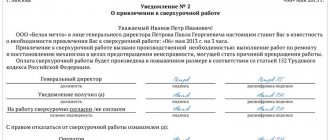Many people mistakenly believe that a disabled person is an inviolable figure for an employer. But this is far from true. This status does not give a person with disabilities special preferences when terminating an employment contract. It may be difficult for him to find a job, but dismissing a disabled employee is a fairly ordinary procedure. It becomes special only if the disability itself became the reason for separation from the employee.
Who are we talking about?
Before talking about whether it is possible to fire a disabled person, it is worth recalling who is included in this category. In everyday life, any person who has physical disabilities can be called disabled, especially if they are visible to others. However, according to the law, this status is assigned to a citizen only by a medical (medical) commission, which issues the disabled person an appropriate certificate. Only after this will the state “notice” him and begin to help in every possible way: it will pay a pension, allow him to use benefits, and begin to provide various social support and protection.
Until a person is diagnosed with a disability, the law “On Social Protection of Disabled Persons in the Russian Federation” does not apply to him. No matter how severe injuries and diseases he suffered. The article will focus on disabled people recognized as such in the prescribed manner.
One of the criteria for disability is the restriction of a citizen to work. The degree of disability he will be assigned depends on how serious they are. There are three gradations in total:
- 1st Art. – light, minimal restriction. In general, work with heavy physical exertion or very long periods of time (for example, a 12-hour shift) is not allowed.
- 2nd Art. – work under normal conditions is not permitted. The employer must worry about setting up a special workplace for a physically disabled employee, consider the “delivery” of a disabled person to the place of duty, etc.
- 3rd Art. – complete disability of the subject.
When the reason for dismissal is disability
Dismissal due to disability means that it was its establishment that became the reason for the termination of the employment contract.
Since life is full of surprises, including unpleasant ones, it is not uncommon for an employee to become disabled after starting work. And sometimes she does not allow him to continue working in the same place. In this case, it is possible to dismiss the disabled person at his own request. If he agrees to this, the procedure is simple: the sick employee warns his superiors: “I’m quitting!”, writes a statement, after 2 weeks receives a paycheck and a work book, after which he leaves work.
But in reality, things may not go so smoothly. Often an employee overestimates his strength, refusing to resign voluntarily. Especially if he occupies a highly paid position. The manager, before dismissing a disabled person, has the right to soften this blow by inviting the employee to resign by agreement. An employee will be more likely to respond to such an option if the agreement provides for the payment of significant compensation.
But if this proposal is rejected by the employee, then the dismissal of the disabled person at the initiative of the employer is inevitable. For the production process to remain efficient, it will have to get rid of the ineffective subordinate.
Payments and compensations
When terminating an employment contract, you should be guided by the general rules regarding payments. But current legislation also establishes some additional compensation for persons with limited ability to work. So, in case of dismissal, a disabled person must be paid:
- wages for hours worked;
- compensation for unused vacation;
- bonuses, allowances and additional payments provided for by a collective or employment agreement and other internal acts of the company;
- severance pay in the amount of two weeks' average earnings (Article 178 of the Labor Code of the Russian Federation).
Legal documents
- by order of the Ministry of Health and Social Development of the Russian Federation dated November 24, 2010 No. 1031n
- by order of the Ministry of Health and Social Development of the Russian Federation dated October 20, 2005 No. 643
- by order of the Ministry of Labor No. 528n dated July 31, 2015
- Art. 81 Labor Code of the Russian Federation
- Art. 73 Labor Code of the Russian Federation
- Art. 77 Labor Code of the Russian Federation
- Art. 178 Labor Code of the Russian Federation
Dismissal of workers with various disability groups
Dismissing an employee due to a disability will require the employer to take certain actions. They will vary slightly depending on what disability group is assigned to the dismissed citizen.
When determining the group, it is taken into account how irreversible the health impairment of the disabled person is and what is the possibility of his rehabilitation. The mildest disability is group 3, the most severe is group 1. As a rule, groups are related to the degree of disability as follows:
- at the first gr. disability is established as the 3rd degree of ability to work;
- at the second gr. disability – 2nd degree of ability to work;
- at the third gr. disability – 1st degree of ability to work.
Third group
Dismissal of a group 3 disabled person at the initiative of the employer usually does not occur for medical reasons. It implies a slight impairment of body functions that does not interfere with the performance of usual work duties. In order to part with an employee, management must look for other grounds for terminating the employment contract. They are the same as those used when dismissing subordinates without disabilities:
- showing up to work drunk;
- unauthorized absence from work (absenteeism);
- establishing the falsity of the documents provided;
- insufficient qualifications of the employee, etc.
A complete list of grounds for initiative dismissal is presented in Article 81 of the Labor Code.
Second group
Dismissal of a group 2 disabled person at the initiative of the employer is sometimes necessary if the employee, having partially retained the ability to work, is no longer able to perform his previous duties. For example, after a stroke, the director’s secretary did not recover his speech. Despite the fact that other functions of his body are not lost, and he can work, he will not be left in his original place. Poor diction will not allow him to cope with his job responsibilities.
Before dismissing an employee, the employer is obliged to offer him another job in the company that suits his current state of health. If such a position is not found in the organization, or the employee refuses it in writing, managers have the right to initiate dismissal.
First group
The dismissal of a disabled person of group 1 is associated with his complete loss of ability to work. Therefore, as a rule, there is no talk of giving him another, easier position. But when terminating a contract with a disabled subordinate, the employer is obliged to give him severance pay equal to the average salary for two weeks. This is the requirement of the Labor Code - Article 178.
Dismissal due to disability (of any group) may be accompanied by the payment of various additional compensations or benefits if the right to receive them is specified in the text of the collective agreement.
Dismissal procedure
Once the decision is made to terminate the working relationship, a series of sequential actions are taken:
- When carrying out the procedure at the employee’s own request, the main document is an application from him;
- If the severance of the labor relationship occurs by agreement, an agreement is drawn up;
- If the procedure is carried out by decision of the manager, a written warning to the employee is required;
- Next, an order is prepared in form T-8 with mandatory notification of the employee (against signature);
- Making an entry in the work book indicating the basis for ending the business relationship.
In case of complete disability, the employer refers to Article 83 of the Labor Code of the Russian Federation.
On the day of dismissal, a book and a certificate of average income are issued to the employee. Further:
- Entering data into the employee’s personal card. The grounds for termination of the working relationship are written down identically to the work book. The employee’s signature confirms the absence of claims or objections on his part;
- Calculation of wages, severance pay, compensation. On the day of departure, the employee must receive all payments prescribed by law.
The disabled employee’s own desire
Often health problems force a disabled person to leave work of his own free will. Sometimes after illness he manages to work effectively, but fulfilling his job duties requires excessive effort. Or he wants to devote more time to rehabilitation and procedures. The motivation for voluntarily resigning can vary. The main thing to know is that in this case, an employee with physical disabilities is dismissed according to the same rules as subordinates without disabilities.
The severity of the disease also does not affect this procedure. Dismissal of a disabled person of group 3 at his own request is no different from the voluntary dismissal of disabled workers of groups 1 and 2. All requirements of Article 80 of the Labor Code must be fulfilled in full.
One of the common mistakes is the belief that a disabled person has the right to quit without working for two weeks. This opinion is incorrect - in most cases it will have to be worked out. Only the good will of the authorities will help to avoid this. Also, not wanting to go to work for another 2 weeks, a disabled person has the right to take leave for this period at his own expense. He can take 60 days a year without the consent of the employer (Article 128 of the Labor Code).
Do they have the right to fire/lay off a group 2 disabled person?
Hello, the ban on dismissal from military service without housing in the absence of the consent of military personnel applies only to military personnel subject to dismissal from military service on preferential grounds (general training, health, age limit), who have served in the RF Armed Forces from 10 to 20 years or more and are recognized in accordance with the established procedure for those in need of housing. In addition, an essential condition is the lack of housing at the place of service (office/dormitory).
CM. Decision of the Judicial Collegium for the Cases of Military Personnel of the Supreme Court of the Russian Federation dated September 14, 2016 N KOPI 16-44
SUPREME COURT OF THE RUSSIAN FEDERATION
In the name of the Russian Federation
SOLUTION
dated September 14, 2021 N KOPI 16-44
The Supreme Court of the Russian Federation composed of:
presiding I.V. Krupnov, judges A.V. Voronov, S.G. Sekerin,
with secretary J.,
with the participation of the administrative plaintiff S.E., her representative S.A., representatives of the President of the Russian Federation Charyev M.R. and Potapov S.E., military prosecutor of the 4th department of the Main Military Prosecutor's Office S.V. Dvortsovaya, having considered the administrative case on the administrative claim of the representative of the administrative plaintiff S.E. — S.A. on declaring invalid the paragraph of the first paragraph 17 of Article 34 of the Regulations on the procedure for military service, approved by Decree of the President of the Russian Federation of September 16, 1999 N 1237 (as amended by Decree of the President of the Russian Federation of January 2, 2021 N 2), in the part allowing dismiss military personnel who are provided with official housing at their place of service, who need residential premises for permanent residence, and who have expressed a desire to exercise their housing rights by receiving a housing subsidy, from military service before the realization of their housing rights, depending on their chosen place of permanent residence,
installed:
Decree of the President of the Russian Federation of September 16, 1999 N 1237 “Issues of military service” approved the Regulations on the procedure for military service (hereinafter referred to as the Regulations).
The original text of this regulatory legal act was published in the publications “Collected Legislation of the Russian Federation” on September 20, 1999, No. 38, Art. 4534, and “Rossiyskaya Gazeta” September 28, 1999, N 191 (up to Article 18 inclusive), September 29, 1999, N 192 (until the end).
By Decree of the President of the Russian Federation of January 2, 2021 No. 2 “On amendments to the Regulations on the procedure for military service, approved by Decree of the President of the Russian Federation of September 16, 1999 No. 1237,” changes were made to paragraph one of paragraph 17 of Article 34 of the Regulations.
This regulatory legal act was published on the official Internet portal of legal information https://www.pravo.gov.ru on January 2, 2021 and in the publication “Collection of Legislation of the Russian Federation” on January 4, 2021, No. 1 (Part II), Art. 216.
In paragraph one of paragraph 17 of Article 34 of the Regulations in the current version, it is established that a military serviceman whose total duration of military service is 10 years or more, who needs housing, without his consent cannot be dismissed from military service upon reaching the age limit for military service , for health reasons or in connection with organizational and staffing measures without providing him with residential premises or a subsidy for the acquisition or construction of residential premises according to the standards established by housing legislation, with the exception of cases provided for in paragraph three of paragraph 1 of Article 23 of the Federal Law “On the Status of Military Personnel” . A serviceman who has expressed a desire to receive residential premises other than the place where he is discharged from military service is discharged from military service and is provided with residential premises in accordance with the legislation of the Russian Federation.
Representative of the administrative plaintiff S.E. — S.A. appealed to the Supreme Court of the Russian Federation with an administrative claim to invalidate the paragraph of the first paragraph 17 of Article 34 of the Regulations (as amended by Decree of the President of the Russian Federation of January 2, 2021 No. 2) in the part allowing for the dismissal of military personnel provided with official residential premises at their place of service those in need of residential premises for permanent residence, who have expressed a desire to realize their housing rights by receiving a housing subsidy, from military service to the realization of their housing rights, depending on their chosen place of permanent residence. In support of his claim, the representative of the administrative plaintiff points out that the contested norm of the Regulations in the interpretation given to her in judicial acts in relation to S.E. violates the right of the administrative plaintiff to perform military service until the implementation of her housing right, which is provided for in paragraph two of paragraph 1 of the article 23 of the Federal Law “On the Status of Military Personnel”. This right cannot be limited in relation to that category of military personnel who are provided with official housing and have expressed a desire to receive a housing subsidy, depending on their chosen place of residence, since a change of place of residence in this case does not pose an additional financial burden for the state. The representative refers to the Rules for calculating subsidies for the acquisition or construction of residential premises (living premises) provided to military personnel - citizens of the Russian Federation and other persons in accordance with the Federal Law “On the Status of Military Personnel”, approved by Decree of the Government of the Russian Federation of February 3, 2014. N 76, according to which the amount of the housing subsidy does not depend on the place of residence chosen by the military personnel after dismissal.
In addition, the representative believes that paragraph three of paragraph 1 of Article 23 of the Federal Law “On the Status of Military Personnel,” introduced by Federal Law No. 97-FZ of April 20, 2015, establishes an exhaustive list of cases when the law allows the dismissal of military personnel without their consent under when they reach the age limit for military service, for health reasons or in connection with organizational and staffing measures, without providing them with residential premises or a housing subsidy. The dismissal of these military personnel, the category of which the administrative plaintiff belongs to, in cases not falling under this list, including those who have expressed a desire to obtain residential premises not at the place of dismissal from military service, as provided for by the contested norm of the Regulations, does not comply with the law.
In confirmation that the administrative plaintiff S.E. is the subject of relations regulated by the contested normative legal act, copies of the decision of the 35th garrison military court dated June 4, 2015, the appeal ruling of the Pacific Fleet Military Court dated August 25, 2015, and other judicial acts in the case of challenging S. are attached to the administrative claim. E. actions of officials related to the dismissal of the administrative plaintiff from military service. According to these judicial acts S.E. her demands were refused, including on the basis of the first paragraph of paragraph 17 of Article 34 of the Regulations.
Administrative plaintiff S.E. and its representative S.A. At the court hearing they supported their claims.
Representatives of the President of the Russian Federation M.R. Charyev and Potapova S.E. the demands of the representative of the administrative plaintiff were not recognized, they asked to refuse their satisfaction and explained that the contested normative legal act was issued by the President of the Russian Federation within the limits of his powers, does not contradict the current legislation and does not violate the rights of the plaintiff.
Having heard the explanations of the parties, the conclusion of the prosecutor Dvortsovaya S.V., who considered it necessary to refuse the administrative claim, and the judicial debate, the Supreme Court of the Russian Federation finds the administrative claim of the representative of the administrative plaintiff S.E. — S.A. not subject to satisfaction, since in the present case there are no circumstances with the presence of which the law connects the possibility of declaring a part of a normative legal act invalid. The court comes to this conclusion based on the following rules of law.
In accordance with parts 1 and 2 of Article 90 of the Constitution of the Russian Federation, the President of the Russian Federation issues decrees that are binding on the entire territory of the Russian Federation.
According to subparagraph 13 of paragraph 2 of Article 4 of the Federal Law “On Defense” of May 31, 1996 N 61-FZ, the President of the Russian Federation approves the regulations on the procedure for military service.
In pursuance of the law, the President of the Russian Federation issued Decree No. 1237 of September 16, 1999, “Issues of military service,” which approved the Regulations on the procedure for military service.
By Decree of the President of the Russian Federation of January 2, 2021 No. 2 “On amendments to the Regulations on the procedure for military service, approved by Decree of the President of the Russian Federation of September 16, 1999 No. 1237,” changes were made to paragraph one of paragraph 17 of Article 34 of the Regulations.
These regulatory legal acts are officially published in the manner prescribed by current legislation. Thus, Decree of the President of the Russian Federation of September 16, 1999 N 1237 in its current version was issued by an official - the President of the Russian Federation in accordance with his powers. In accordance with the requirements of Part 3 of Article 15 of the Constitution of the Russian Federation, it is officially published for public information.
Contrary to the arguments set out in the administrative statement of claim, there are no grounds for concluding that the paragraph of the first paragraph 17 of Article 34 of the Regulations in the modern version contradicts the current legislation and that, as a result, the rights of military personnel, including the administrative plaintiff, are violated.
The legislation provides for various forms and procedures for providing military personnel and citizens discharged from military service with residential premises, establishing differentiated guarantees depending on the categories of military personnel and their choice of a specific method of exercising housing rights. Such legal regulation is not a violation of their constitutional rights, provided that the right to housing, guaranteed by Article 40 of the Constitution of the Russian Federation, is respected. This position is set out in the ruling of the Constitutional Court of the Russian Federation dated May 26, 2021 N 1046-O “On the refusal to accept for consideration the complaint of citizen S.E. for violation of her constitutional rights by the first paragraph of paragraph 17 of Article 34 of the Regulations on the Procedure for Military Service" and in a number of other definitions (dated September 25, 2014 N 2271-O, dated October 27, 2015 N 2527-O and others).
According to paragraph two of paragraph 1 of Article 23 of the Federal Law “On the Status of Military Personnel” as amended by Federal Law No. 97-FZ of April 20, 2015, military personnel are citizens whose total duration of military service is 10 years or more, registered as needing residential premises in a federal executive body in which federal law provides for military service, without their consent, they cannot be dismissed from military service upon reaching the maximum age for military service, health conditions or in connection with organizational and staffing measures without providing them with residential premises premises or housing subsidy, except for the cases provided for in the third paragraph of this paragraph. If these military personnel wish to receive living quarters other than the place where they were discharged from military service, they are provided with living quarters at their chosen place of residence in the manner prescribed by paragraph 14 of Article 15 of this federal law.
Thus, the legislator, by highlighting in this norm military personnel who wished to receive living quarters not at the place of discharge, actually established that the guarantee in the form of a ban on the dismissal of the relevant categories of military personnel in need of special protection, without their consent, before providing them with living quarters or a housing subsidy is provided for persons registered as needing residential premises in order to provide housing at their place of service. At the same time, in order to ensure the constitutional right to housing, this guarantee can be extended to the specified military personnel who are not provided with any housing at the time of dismissal and who object to dismissal without the provision of housing in the manner that they have chosen.
This interpretation of the law is consistent with the position of the European Court of Human Rights, expressed in the judgment in the case “Sladkov v. Russia” of December 18, 2008 (complaint No. 13979/03), which stated that this norm protects military personnel from homelessness by the fact that connects the possibility of their dismissal with the provision of housing. The law does not prohibit military personnel from leaving service if they agree to retire without receiving housing.
As for military personnel who wish to exercise their right to receive residential premises at their chosen place of residence after dismissal, which does not coincide with the last place of service, then in paragraph 14 of Article 15 of the Federal Law “On the Status of Military Personnel” a special procedure for the provision of residential premises is established for them, which is aimed , first of all, to exercise the constitutional right to choose a place of residence, guaranteed by Article 27 of the Constitution of the Russian Federation.
At the same time, paragraph 3 of Article 6 of the Federal Law “On the Status of Military Personnel” states that military personnel undergoing military service under a contract, upon dismissal from military service, have the right to choose permanent residence in any locality of the Russian Federation or in another state in accordance with federal laws, other regulatory legal acts of the Russian Federation and international treaties of the Russian Federation.
In order to ensure the possibility of exercising this right, the legislator, as stated above, in paragraph 14 of Article 15 of the Federal Law “On the Status of Military Personnel” established that the provision of living quarters to military personnel - citizens with a total duration of military service of 10 years or more, upon dismissal from military service upon reaching the age limit for military service, state of health or in connection with organizational and staffing measures and members of their families when changing their place of residence, it is carried out by the federal executive authorities that provide for military service, at the expense of the federal budget for the construction and purchase of residential premises, including through the issuance of state housing certificates. The right to provide housing under these conditions is granted to these citizens once. Documents on the delivery of residential premises to the Ministry of Defense of the Russian Federation (another federal executive body in which military service is provided for by federal law) and deregistration at the previous place of residence are submitted by the indicated citizens and members of their families living together with them upon receipt of residential premises at the chosen place of residence.
This provision of the law does not contain a ban on the dismissal of military personnel before they are provided with living quarters at their chosen place of residence.
According to paragraphs three and twelve of paragraph 1 of Article 15 of the Federal Law “On the Status of Military Personnel,” the payment of a housing subsidy is one of the forms of exercising the rights of military personnel to housing, including in the manner established in paragraph 14 of Article 15 of the said law, which is equivalent in legal consequences to other methods provision of residential premises - in the form of residential premises in kind in ownership or under a social tenancy agreement.
Analyzing the above norms in conjunction, the court comes to the conclusion that the military personnel specified in paragraph two of paragraph 1 of Article 23 of the Federal Law “On the Status of Military Personnel” who wished to exercise the right to choose a permanent place of residence upon dismissal from military service with the provision of their living quarters premises, regardless of the form of such security, when changing place of residence, they cannot claim a social guarantee in the form of a ban on dismissal without their consent before receiving residential premises, provided that they have previously been provided with residential premises, including office premises, from which they are not subject eviction before provision of permanent housing.
This interpretation of the law is based on the indication in the first paragraph of paragraph 14 of Article 15 of the said law that the provision of housing in this manner is carried out “upon a change of place of residence.” In accordance with Article 20 of the Civil Code of the Russian Federation, the place of residence is the place where a citizen permanently or primarily resides. According to paragraph eight of Article 2 of the Law of the Russian Federation of June 25, 1993 N 5242-1 “On the right of citizens of the Russian Federation to freedom of movement, choice of place of stay and residence within the Russian Federation” (as amended on June 2, 2021) place of residence are a residential building, apartment, room, residential premises of a specialized housing stock or other residential premises in which a citizen permanently or primarily resides as the owner, under a lease (sublease) agreement, a lease agreement for specialized residential premises or on other grounds provided for by the legislation of the Russian Federation , and in which he is registered at his place of residence.
Thus, military personnel who have a place of residence at the last place of service before dismissal, including in the form of specialized residential premises, are not recognized according to their own will as needing residential premises at the last place of service, but who wish to change their place of residence in the manner established by paragraph 14 of Article 15 of the Federal Law “On the Status of Military Personnel” are not included in the list of persons specified in the first sentence of paragraph two of paragraph 1 of Article 23 of the Federal Law “On the Status of Military Personnel” who have the right to social guarantee in the form of a ban on dismissal before receiving housing, since this the group, within the meaning of the law, is singled out as a separate category of citizens in order to exercise their right to freedom of choice of place of residence upon dismissal from military service, ensuring the opportunity to exercise this right by providing residential premises in their chosen place of residence instead of those rented at the last place of service.
Such military personnel are provided with other guarantees for the implementation of the provisions of Article 40 of the Constitution of the Russian Federation - a ban on eviction from official housing before receiving residential premises for permanent residence in their chosen place of residence in accordance with paragraph 5 of the Regulations on the conditions and procedure for concluding a housing contract between military personnel and the Ministry of Defense of the Russian Federation or another federal executive body in which the law provides for military service, approved by Decree of the Government of the Russian Federation of May 4, 1999 N 487, or payment of monthly monetary compensation for renting (subletting) residential premises in the manner and amount determined by the Decree of the Government of the Russian Federation dated December 31, 2004 N 909 “On the procedure for paying monetary compensation for renting (subletting) residential premises to military personnel - citizens of the Russian Federation performing military service under a contract, citizens of the Russian Federation dismissed from military service, and members of their families” (as amended dated September 18, 2015), including in cases where discharged military personnel wish to go to the locality in which they have chosen a place of residence, before receiving living quarters there.
Based on the foregoing, the court comes to the conclusion that the norm of the Regulations challenged by the administrative plaintiff does not contradict a normative legal act that has greater legal force - the Federal Law “On the Status of Military Personnel”, does not violate the rights and legally protected interests of the administrative plaintiff, the specified normative legal act was issued in within the competence of the President of the Russian Federation, due to which the administrative claim is not subject to satisfaction.
The argument of the representative of the administrative plaintiff that the amount of the housing subsidy does not depend on the place of residence chosen by the serviceman after dismissal does not affect the assessment of the legality of the provision of the Regulations he disputes, since the law establishes a difference in the guarantees provided for the realization by military personnel of the right to housing depending not on the form of provision of housing premises, but on the order they chose to receive it.
The opinion of the administrative plaintiff that in paragraph three of paragraph 1 of Article 23 of the Federal Law “On the Status of Military Personnel”, introduced by Federal Law No. 97-FZ of April 20, 2015, an exhaustive list of cases is established when the law allows the dismissal of military personnel without their consent reaching the age limit for military service, health reasons or in connection with organizational and staffing measures without providing them with living quarters or a housing subsidy, is erroneous. This provision contains cases of abuse by the persons specified in the first sentence of paragraph two of paragraph 1 of the said article of the law of their right to housing, when the legislator recognized it as permissible to deprive them of social security in the form of a ban on dismissals without providing housing. However, this provision of the law does not mean the extension of this guarantee to military personnel who have expressed a desire to receive living quarters at their chosen place of residence, which differs from their last place of service.
Based on the above, guided by Articles 175, 176, 180, 227 of the CAS RF, the Supreme Court of the Russian Federation
decided:
in satisfying the administrative claim of the representative of the administrative plaintiff S.E. — S.A. on declaring invalid the paragraph of the first paragraph 17 of Article 34 of the Regulations on the procedure for military service, approved by Decree of the President of the Russian Federation of September 16, 1999 N 1237 (as amended by Decree of the President of the Russian Federation of January 2, 2021 N 2), in the part allowing refuse to dismiss military personnel who are provided with official housing at their place of service, who need residential premises for permanent residence, and who have expressed a desire to exercise their housing rights by receiving a housing subsidy, from military service before the exercise of their housing rights, depending on their chosen place of permanent residence.
The decision can be appealed to the Appeals Board of the Supreme Court of the Russian Federation within a month from the date of its adoption in final form.
Presiding
I.V.KRUPNOV
Judges
A.V.VORONOV
S.G.SOKERIN
Reduction of disabled people
Sometimes company managers doubt whether they can lay off a disabled person. The answer to them will be yes. The law not only does not prohibit the dismissal of a disabled person, but also does not give them any preferences for health reasons. The exception is the situation when the disability was received:
- for an occupational disease or work injury that an employee acquired while working for a specific employer;
- in war or during hostilities;
- due to radioactive disasters.
Then the disabled employee has an advantage over other employees to remain in the “optimized” organization. In other cases, the employer has the right to dismiss a disabled person on a general basis.
An employee with a disability may be terminated for a variety of reasons. It cannot be said that the state is actively protecting him from losing his job. However, in this matter, social care should not be excessive. Otherwise, problems with finding work among disabled people will not be solved, but will only increase.










